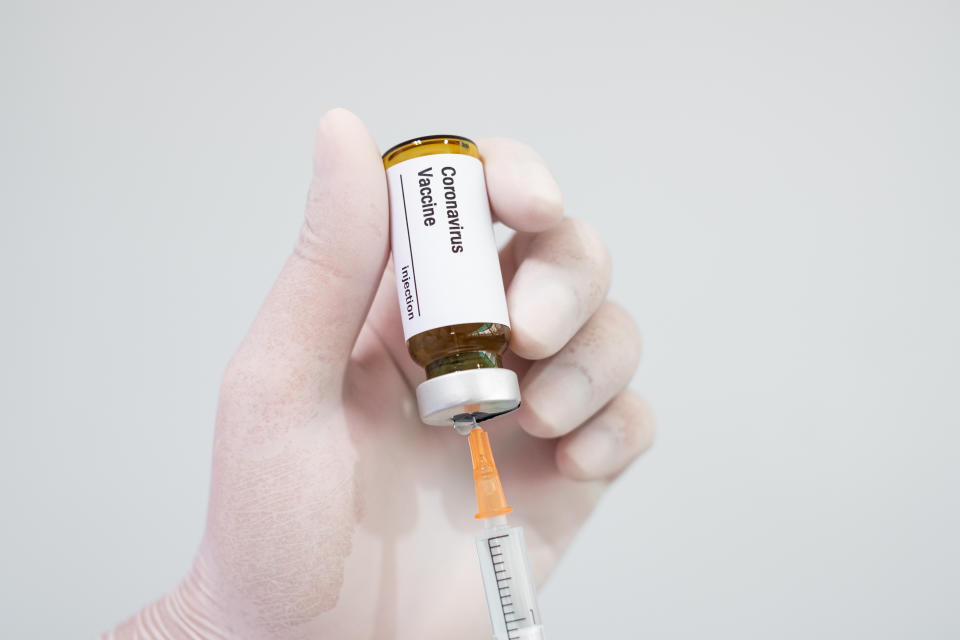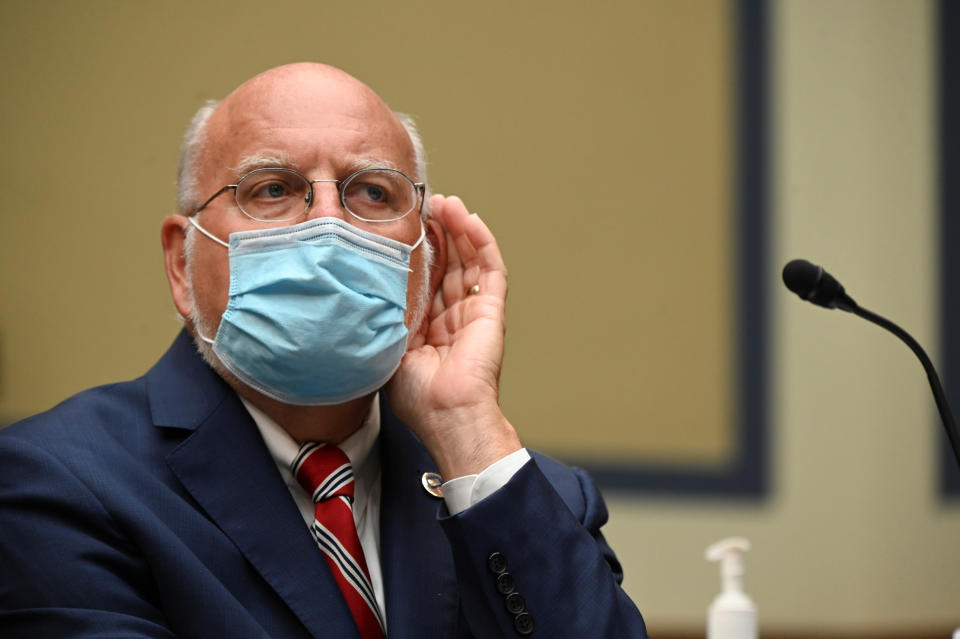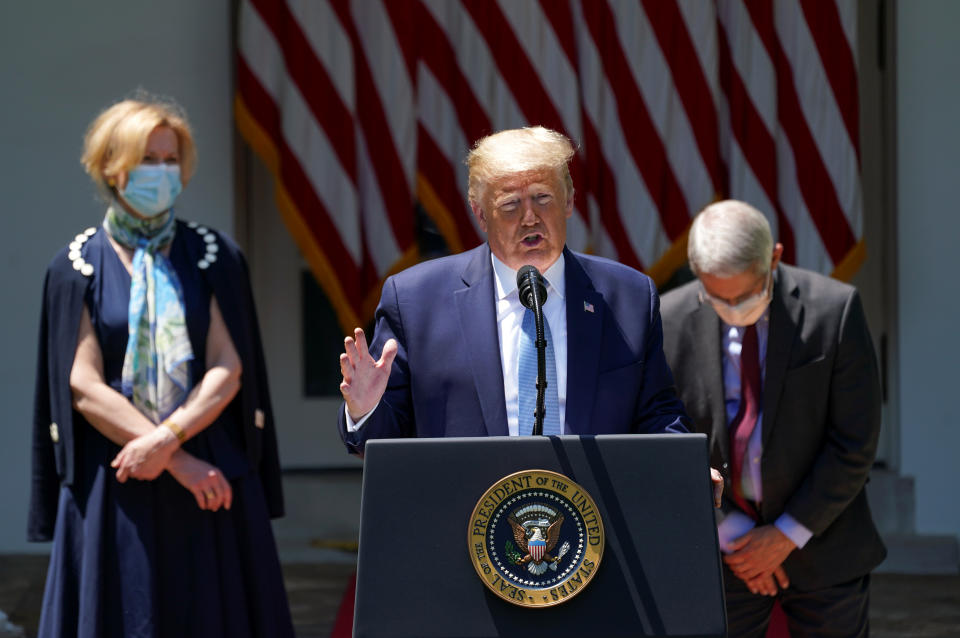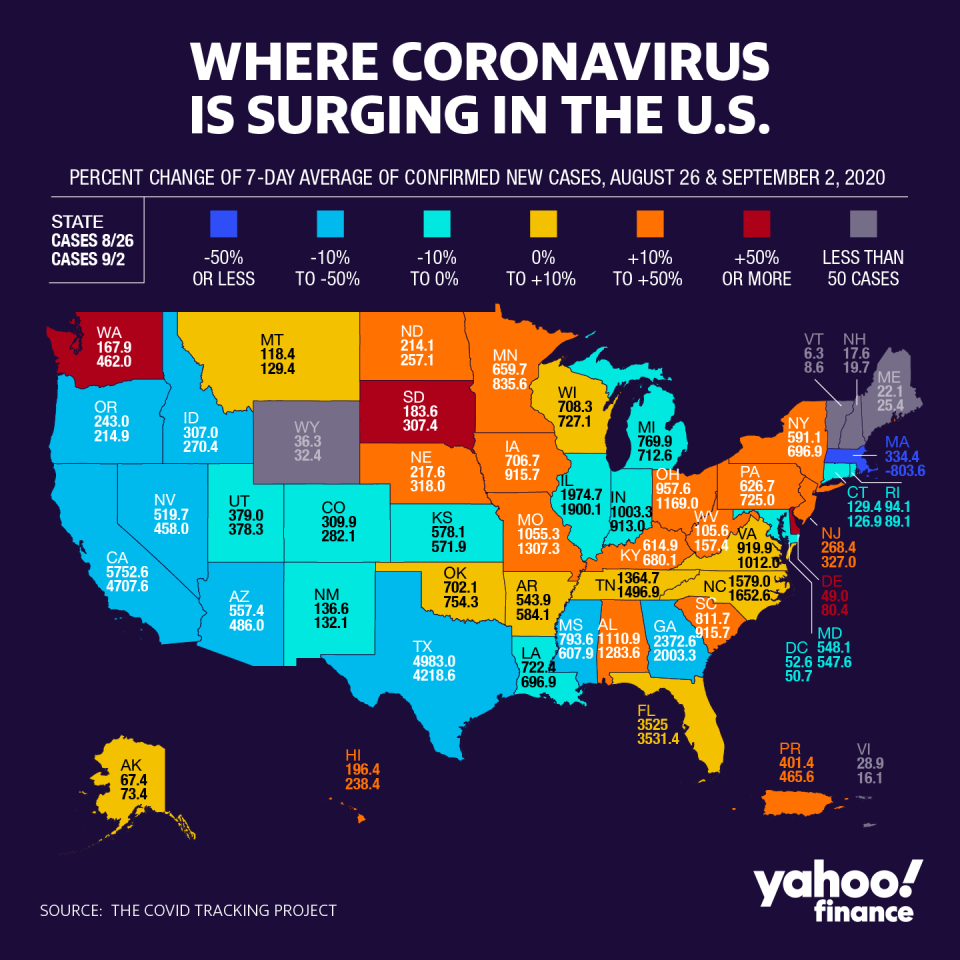'Great for the manufacturers': How the law shields drug makers chasing a COVID vaccine
The U.S. Centers for Disease Control and Prevention (CDC) has asked state governors to prepare to distribute vaccines to high-risk individuals between the end of October and early November.
“For what I anticipate will be reality, is that there’ll be one or more vaccines available for us in November, December,” CDC Director Robert Redfield told Yahoo Finance on Wednesday.
If COVID-19 vaccines do become a reality, those willing to give one a try should keep in mind that if the inoculation injures them or their loved ones, avenues for compensation are limited.
A recent declaration by U.S. Department of Health and Human Services Secretary Alex Azar preemptively slots prospective claims alleging injury from COVID-19 vaccines, treatments, diagnostics, and “other related countermeasures” under a federal program called the Countermeasures Injury Compensation Program (CICP).
The program widens manufacturers’ liability protections already in place for certain vaccines known to cause injury, and shifts a majority of personal injury lawsuits out of the judicial system and into an administrative body.
Liability protection ‘great for manufacturers’
“It’s great for the manufacturers, because you can imagine the liability,” veteran vaccine plaintiffs’ attorney Sean Greenwood said of the potential for mounting claims if a vaccine is shown to cause harm, a reality that played out in the 1950s when Cutter Laboratories’ tainted polio vaccine killed and paralyzed children.

The program’s intent is to incentivize pharmaceutical companies like Johnson & Johnson (JNJ), AstraZeneca (AZN), Moderna (MRNA), Sanofi (SNY), GlaxoSmithKline plc (GSK), and Pfizer (PFE) — among others in the race to discover and commercialize COVID-19 vaccines — to press forward with research, development, and commercialization without worrying that their efforts will be swallowed by tort liabilities. It’s also intended to ensure that companies create and maintain adequate vaccine supply, as well as stabilize vaccine costs.
The legal assurance is also a boon for investors banking on stock price spikes for the first companies to bring viable COVID-19 vaccines and therapies to market. At the same time, the advantage is somewhat tempered by European Union laws that offer only partial liability protection to vaccine makers.
In theory, CICP compensates injured claimants so long as they meet a narrow set of criteria, meanwhile relieving them of a difficult burden of proof that would otherwise be required in a typical personal injury case.
SEE ALSO: CDC’s Redfield laments polarization during coronavirus ‘war,’ warns on Labor Day travel spending
However, according to the U.S. Department of Health and Human Services’ Health Resources and Services Administration, the program has not yet been funded. It therefore currently lacks money to compensate any claimants who may be injured by a COVID-19 vaccine or treatment. A spokesperson for the agency told Yahoo Finance that so far CICP has neither requested nor been allocated funding from Congress.
“As the need for funding for COVID-19 related claims becomes clearer, those requests will be made,” the spokesperson said.
‘Good luck without a lawyer navigating this stuff’
According to Reuters, CICP has paid out 39 claims totaling $5.7 million since it began administering claims in 2010.
And while vaccine injuries are rare, adverse impacts ranging from mild to life-threatening do occur. Each year since 2015, more than 40,000 adverse events following vaccination were reported to the Vaccine Adverse Events Reporting System (VAERS), a database managed by the CDC. The reported cases are thought to underrepresent the actual number of patients who suffer adverse reactions. In 2019, 47,525 adverse events were reported.

Normally, patients who experience a vaccine injury are barred from using the judicial system, and can seek compensation for their alleged injuries under the National Vaccine Injury Compensation Program (NVICP), an established system currently funded with $4 billion that since the 1980s has been used to pay out vaccine injury claims. Over a 30 year period from 1988 to 2018 the program adjudicated 19,114 petitions, from which it determined 7,542 to be compensable.
Plaintiffs’ attorneys who specialize in vaccine injuries say NVICP is well equipped to handle any injuries resulting from COVID-19 vaccines and CICP may unfairly disadvantage injured patients.
Authorized by the Public Readiness and Emergency Preparedness Act (PREP Act) and managed under the U.S. Department of Health and Human Services, the NVICP pushes claimants into a “no-fault” system that relieves them of the difficult scientific burden of proving a vaccine caused their injury.
Instead, the federal government recognizes certain “Table” injuries known to result from vaccines, and permits compensation to claimants, so long as they show that within a certain timeframe of receiving a listed vaccine they sustained a particular injury. The program is funded by a $0.75 excise tax on vaccine vial sales.
While both programs promote vaccine development, CICP further narrows the circumstances under which prospective claimants can receive compensation, by providing no compensation for attorney’s fees, or for pain and suffering, allowing no expert witnesses testimony, no hearings, no appeals, and shortening the time frame to file a claim to one year.
“Good luck without a lawyer navigating this stuff, because it’s extremely complicated,” Greenwood said, adding that about 60% of his prospective clients go totally uncompensated even under the NVICP because they learn about the program too late, after its 3-year statute of limitations has expired.
CICP is a major problem for those who cannot afford a lawyer, Greenwood said, because foregoing counsel will lead to fewer and smaller awards for injuries.
“You really do need someone advocating on your behalf to help you navigate the system,” Leah Durant, a vaccine lawyer who has spent her career handling injury cases through the NVICP program, told Yahoo Finance.

“I think not having to compensate attorneys under CICP will have a chilling effect on the number of people who seek an award under the program,” she said.
Under NVICP, claimants can recover up to $250,000 in pain and suffering compensation, as well compensation for past and future medical expenses. They’re also afforded the opportunity to present expert witnesses to bolster their case, and under certain circumstances, to appeal their award.
‘You want pharmaceutical companies making vaccines’
Greenwood and Durant agreed that the NVICP, and the concept of handling vaccine injury claims outside of the regular court system, is good for all parties involved, but particularly because it provides enough leeway to adequately compensate those who suffer serious injuries.
“You want pharmaceutical companies making vaccines,” Greenwood said. “If they were getting popped for millions and millions of dollars every time for that 1% of recipients who suffered an injury, maybe they would stay in the market, maybe not.”
Durant also worries that HHS’s effort to push COVID-19 vaccine claims into the more restrictive program, as well as a proposal to change a rule that automatically allows injury claims for vaccines recommended for administration to children, will further erode the public’s confidence in the anticipated inoculations. Pending public comments on the proposal due January 12, 2021, the change could prohibit NVICP claims on behalf of children injured by a COVID-19 vaccine.
“We are already worried about about vaccine hesitancy and the number of folks who just say, ‘Hey listen, I'm interested, but I don't want to be in the first round,’” she said.

It’s not known whether or not the federal government’s goal to deliver 300 million doses of safe, effective COVID-19 vaccine by January 2021 under Operation Warp Speed could lead to a higher incidence of claims than for vaccines developed and studied over longer timeframes.
Asked whether the rapid development pace targeted for COVID-19 vaccines will lead to a larger percentage of vaccine injuries, University of Pittsburgh assistant history professor Mari Webel, who focuses on public health policy, said it’s difficult to analogize past vaccine development with today’s pandemic efforts.
“We we are living in a different kind of regulatory, atmosphere now than we were when polio vaccines were developed,” Webel said. Still, Webel agreed that there’s an assumption that faster science is riskier science, despite regulators’ best efforts.
“There will be injuries that occur. No matter how rare they are, there will be injuries,” Durant said.
A list of all COVID-19 prevention methods, treatments and diagnostics that are protected from liability under the Countermeasures designation can be found here.
Pharmaceutical Research and Manufacturers of America (PhRMA), which lobbies on behalf of major biopharmaceutical research companies, declined to comment on the designation.
Alexis Keenan is a legal reporter for Yahoo Finance and former litigation attorney.
Follow Alexis Keenan on Twitter @alexiskweed.
